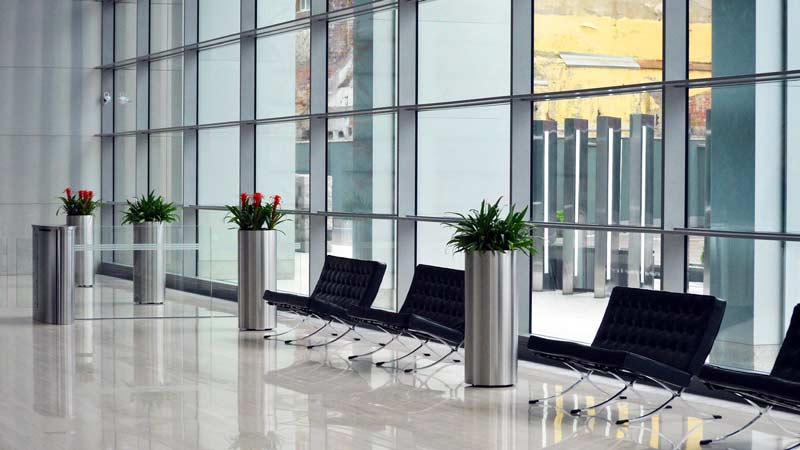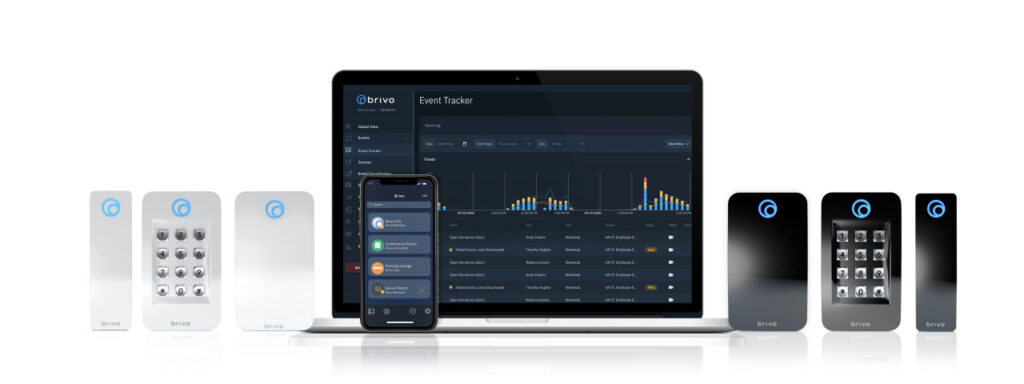Access control is…
the process of managing the entry or access to specific buildings or locations for individuals
who have authorization to be there. Access control can also be used to limit the use of
restricted locations within a facility.
Spaces that can benefit from access control
Many spaces can benefit from access control; complete buildings, specific floors, critical areas
like server rooms and managers’ offices, as well as premium amenities such as gyms, pools and
conference rooms.
Reasons for investing in access control
There are three different types of access control technologies:
- Lock and Key: The oldest form of access control where locks are fitted into entryways in order to
prevent unauthorized access. Access to the facility is granted manually using a brass key. - On-Premise Access Control: Software that is located on the premises of the facility which allows
control of who enters. Data for access is stored locally on specially assigned servers, which are
maintained on-site. Access to the facility is granted via ID cards, fobs, or smartcards. - Cloud-Based Access Control: Software is hosted/located in the cloud which allows
administrators to control access to their buildings from anywhere at any time. Data is
stored in the cloud, and available at anytime, through a web browser or mobile device.
Access to the facility is granted via ID cards, fobs, mobile devices, or smartcards.
Comparing access control options
- Lock and Key
Lock and key used to be the only option consumers had to secure their doors and facilities. While it is still a common option for smaller offices with fewer employees, this method has a number of drawbacks. Keys can easily be duplicated, lost, stolen or shared with others. Once keys are lost, all doors must be re-keyed to ensure proper security. This can cost a considerable amount of money as well as causing a big inconvenience.
Traditional lock and key security has many limitations when compared to modern security solutions. Keys cannot open doors remotely or track who has entered or left a facility. With lock and key security there is no way to know who has access to the premise, unless you are keeping a spreadsheet of who has keys to which doors. Keys are unable to verify employee identities or provide automated security control, so anyone with a key can enter a facility. Overall this solution has limited flexibility and requires individuals to be on-site to open and lock doors, and track facility access. In this age where everything we do is integrated and interconnected, locks and keys fall behind as they are a standalone solution that cannot be integrated with any other system. - On-Premise Access Control
On-premise solutions are the next step up from a lock and key solution. They provide more features, functionality and automation. These solutions require that an IT person maintains and updates the servers where the software lives. It also requires that the administrator is versed in cybersecurity to ensure that the servers don’t get infected by cyberattacks.On-premise solutions don’t typically provide remote access to the system which means that most system changes have to be made locally on a dedicated PC that is connected to the servers. Anytime you need to add a new door, or grant access to a new person, you must make the changes on-site. As you can tell, the flexibility of this solution is limited. Just like lock and key security, on-premise security has limited scalability and multiple sites require multiple servers. To maintain IT security, on-premise software requires constant manual data backups and firmware updates. This can take up a considerable amount of time, money and resources. - Cloud-Based Access Control
Cloud-based access control is the best choice when it comes to securing your facility. No other type
of access control provides more protection, is more convenient or is easier to use.
- Cloud access control allows for complete control from anywhere in the world
- Employees are able to open doors with their phone,
eliminating the risk of lost or stolen keys and keycards - There are no servers to maintain and the software is updated
automatically to protect against cyber threats - Real-time data is collected about traffic in and out of the building
- When key cards are lost or stolen, cloud based solutions
make it possible to revoke access immediately - Cloud-based access control allows for unlimited scalability
and doors, offices and users can be added at any time - Ability to open and secure doors remotely eliminates the
need to hire additional on-site staff for gatekeeping - Video surveillance integrated with cloud access control
provides an additional layer of security - API integrations available for software applications,
such as HR, visitor and membership tools
Cloud-Based Access Control – The Better Solution
Access control can take up a lot of resources when handled in-house and usually requires a large, ongoing investment. Cloud-based security is offered on a subscription basis, where you pay a monthly fee for the services you use. This helps businesses optimize cash flow and save internal resources.
Cloud access control provides an unsurpassed level of security. It reduces the inconveniences of updating and managing the system manually and in-house.
Why Brivo
Brivo has an innovative cloud-based access control solution that utilizes today’s most advanced technologies to provide exceptional service and security to facilities of all shapes and sizes.
Over ten million users around the globe trust Brivo to protect their facilities and their people. Brivo disrupted the access control industry in 2002 by being the first company to deliver modern remotely driven access control to businesses who were tired of the inconveniences of on-premise solutions. As a small business, we believe in building long term relationships with our customers and never stop providing them with technical support. Trust the power and convenience of mobile device managed access control and video management, trust Brivo.



